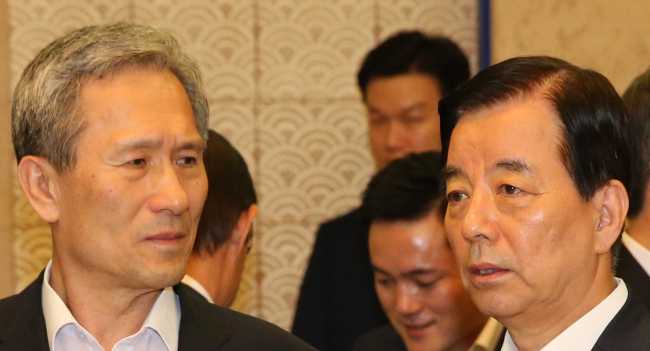During the previous Park Geun-hye administration, most high-profile decisions about national security were led by two former Army generals: Han Min-koo and Kim Kwan-jin.
Kim was first defense minister and then the president’s chief security adviser. Han, two years junior to Kim, took over the minister’s office from Kim.
The duo shared many aspects in common.
They both graduated from the Korean Military Academy, equivalent to West Point in the US, and climbed up the military ladder much faster than others, leaving the military with top positions under their belt. They both held the title of chairman of Joints Chiefs of Staff before leaving the Army.
Their decorated career, however, is on the brink of ending in disgrace as they are under investigation for hiding crucial information from their new commander in chief, President Moon Jae-in.
 |
Former National Security Office chief Kim Kwan-jin (left) and Defense Minister Han Min-koo (Yonhap) |
On Wednesday, Han and Min underwent investigation by Cheong Wa Dae for “deliberately” failing to report to President Moon about the fact that there are four additional THAAD launchers placed in South Korea. Before the revelation, the existence of only two launchers were known to the public. The deployment of the Terminal High Altitude Area Defense system is a highly sensitive issue that has brought about a sharp division among the Korean public as well as neighboring countries.
“It amounts to mutiny and disruption of national discipline,” said Rep. Shim Jae-kwon of President Moon’s governing Democratic Party, who serves as a member of the National Assembly foreign affairs and unification committee.
Kim and Han were key players during the THAAD negotiations and considered to be among the few with knowledge of the existence of the four launchers.
But the two Army generals had been criticized for lack of transparency in the whole process leading to the deployment of the system, even withholding related information during a parliamentary hearing.
Whenever Han was asked about the THAAD deployment by lawmakers, Han appeared to feign ignorance about the process. On May 6, when THAAD components were on their way to South Korea, Han told lawmakers that he was not aware of the specific timeline.
Meanwhile, security chief Kim is under fire for abusing his power to “finalize” the THAAD deployment during his visit to the United States in January and March, when former President Park Geun-hye was suspended from power after being impeached by lawmakers over a massive bribery scandal.
Some progressive lawmakers suggested that the whole deployment process was virtually led by Kim, who, they said, refused to hand over critical information about THAAD to his successor in the new government.
“Cheong Wad Dae didn’t receive a single paper from Kim about THAAD,” said Rep. Kim Jong-dae of the minor Justice Party in an interview with local media Wednesday. “Kim has never handed over critical information like how the deployment decision was made.”
This is not the first time that military leadership has clashed with liberal governments, whose progressive agenda has often attracted criticism in the military mostly led by Army generals with hawkish views on North Korea.
In 2004, former President Roh Moo-hyun ordered a massive investigation over the military’s inaccurate report when a North Korean vessel breached the Northern Limit Line, the de facto maritime border with the North, which has long disputed it.
Contrary to the military’s report that the North did not respond to the South’s warnings, the investigation revealed that the North sent a reply back to the South. Following the probe, then-Defense Minister Cho Young-kil resigned.
By Yeo Jun-suk (
jasonyeo@heraldcorp.com)








